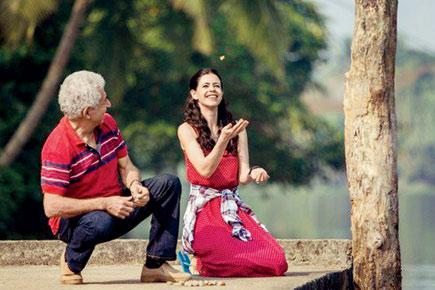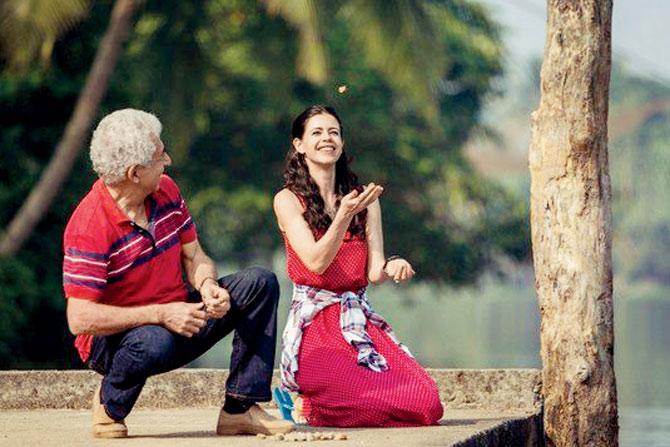"Why no Malayalam film at Dubai Film Festival, Madam?" a film fan asked me online recently. It is great to know that film fans feel so proprietory about the Dubai International Film Festival (DIFF), but it isn't exactly my baap ka maal, even though I've been their South Asia Consultant for six years.

Naseerudin Shah and Kalki Koechlin in Anu Menonu00c3u00a2u00c2u0080u00c2u0099s film Waiting
 "Why no Malayalam film at Dubai Film Festival, Madam?" a film fan asked me online recently. It is great to know that film fans feel so proprietory about the Dubai International Film Festival (DIFF), but it isn't exactly my baap ka maal, even though I've been their South Asia Consultant for six years. In fact, we did have what you might technically call a Malayali film, but Indian cinema is rapidly becoming so global, it would be challenging to label it as such. Take Anu Menon's Waiting, for instance, about two people whose spouses are in a coma, that is set almost entirely in Kochi, in the heart of Kerala. It has been directed by a Tamilian married to a Malayali, who is based in London; produced by Manish Mundra, who is based in Dubai; starring Naseeruddin Shah and Kalki Koechlin who are based in Mumbai; and the film is in English and Hindi.
"Why no Malayalam film at Dubai Film Festival, Madam?" a film fan asked me online recently. It is great to know that film fans feel so proprietory about the Dubai International Film Festival (DIFF), but it isn't exactly my baap ka maal, even though I've been their South Asia Consultant for six years. In fact, we did have what you might technically call a Malayali film, but Indian cinema is rapidly becoming so global, it would be challenging to label it as such. Take Anu Menon's Waiting, for instance, about two people whose spouses are in a coma, that is set almost entirely in Kochi, in the heart of Kerala. It has been directed by a Tamilian married to a Malayali, who is based in London; produced by Manish Mundra, who is based in Dubai; starring Naseeruddin Shah and Kalki Koechlin who are based in Mumbai; and the film is in English and Hindi.

Naseerudin Shah and Kalki Koechlin in Anu Menon's film Waiting
ADVERTISEMENT
Similarly with some of the other Indian films at DIFF. Raam Reddy's Thithi is co-produced by Sunmin Park (Korean-born producer of the US-based Maxmedia) and his dad Pratap Reddy, with cinematographer Doron Tempert and co-editor John Zimmerman, both Reddy's schoolmates from the Prague Film School, where he studied. It is about four generations of a rural Karnataka family, and was shot in Mandya, near Bengaluru, featuring mainly non-actors. Likewise, For the Love of a Man, a docu-feature on Tamil superstar Rajnikant's fans, was shot in Chennai, directed by Netherlands-based Rinku Kalsy (she recently moved to Mumbai), and produced by US-based Joyojeet Pal (fans travelled from Abu Dhabi to see it). The other Indian films at Dubai were Nagesh Kukunoor's Dhanak and Kamal Swaroop's Battle for Banaras, an insightful documentary on the 2014 Lok Sabha election campaigns in Varanasi, from where prime minister Narendra Modi was elected, that shockingly remains banned in India. Also from South Asia were Vimukthi Jayasundara's Dark in the White Light (Sri Lanka) and Sharmeen Obaid-Chinoy's Song of Lahore (Pakistan). Deepa Mehta was president of the Muhr Feature Competition Jury (her Beeba Boys was at DIFF), while Naseeruddin Shah received a Lifetime Achievement Award. There was also Bilal, an animation feature directed by Pakistani director Khurram Alavi, with co-director and producer Ayman Jamal from Dubai, on an African slave boy who becomes an inspiring hero in the Middle East, emphasising social justice in Islam.
The Middle East is a crucial market for Indian films, including Bollywood and South Indian films, and DIFF usually showcases these. In previous editions, its Malayalam films have included Njan Steve Lopez, Shutter, Swapaanam, Akam and Elektra, while its Tamil films have included Kaakkaa Muttai, Mynaa and Maithanam. In fact this year, Indian film producer Manish Mundra, who lives in Dubai (but works in Nigeria), pulled a triple whammy: he produced three diverse films shown at DIFF — Waiting, Dhanak and For the Love of a Man.
My enjoyable duties at DIFF include conducting Q/As for Cinema of the World films, and this year included Mexican, Thai, Iranian, Canadian, Colombian, Croatian, Sri Lankan, and, of course, Indian films. Deepa Mehta's Beeba Boys threw a googly by being a Punjabi, Hindi and English film that came with only partial Arabic subtitles. But the bigger googly came when I interviewed Iranian actress Niki Karimi for the film Wednesday May 9. When I asked her a question in English, she replied in Farsi and an interpreter translated her answer into English. But two Arab women in the audience requested Arabic translations — reasonable, given that it is an Arab festival. Now, I asked Karimi a question in English, Translator 1 translated it into Farsi and Translator 2 translated it into Arabic. Karimi replied in Farsi, T1 translated it into English and T2 translated it into Arabic. By the time the second question went out on this multi-lingual round-robin, the audience was rolling its eyes. What to do? Globalisation is like that only.
But later, my Malayali friends in Dubai treated me at the Calicut Paragon and Calicut Notebook, two outstanding restaurants with terrific regional cuisine, of which even fancy-schmancy Mumbai cannot boast. They could have been Mumbai's answer to globalisation. Are Mumbai's Mallus listening? Or only waiting?
Meenakshi Shedde is South Asia Consultant to the Berlin Film Festival, award-winning critic, curator to festivals worldwide and journalist. Reach her at meenakshishedde@gmail.com.
 Subscribe today by clicking the link and stay updated with the latest news!" Click here!
Subscribe today by clicking the link and stay updated with the latest news!" Click here!







